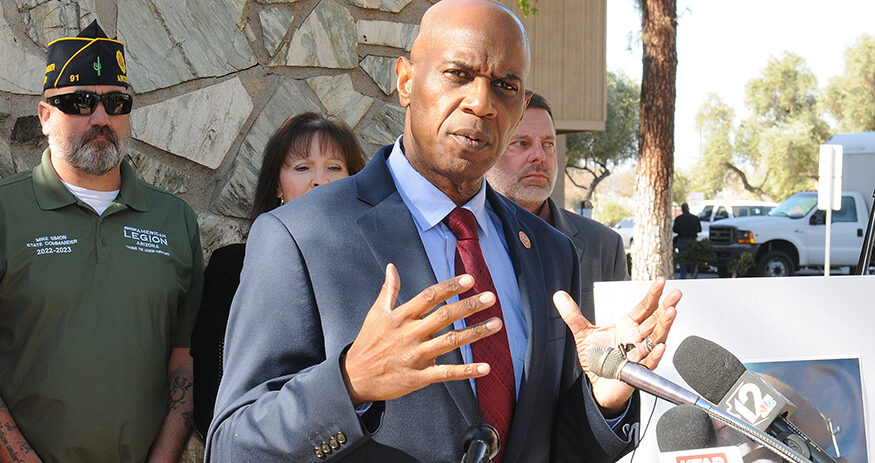Rep. Blackman proposes stolen valor law
Howard Fischer, Capitol Media Services//January 15, 2025//
An Army veteran who earned a Bronze Star for his actions in combat in Iraq wants to send some of those who fake their veteran status or their medals to prison.
But Rep. Walt Blackman, R-Snowflake, said he crafted his Stolen Valor legislation to avoid the same legal problems that resulted in the U.S. Supreme Court in 2012 voiding a similar federal law as a violation of free speech rights in the First Amendment. He said only if someone seeks to profit from a deliberate misrepresentation could they end up behind bars.
And the former tank commander said there’s another reason for the state to have its own law: It would spell out that anyone convicted under the legislation who was holding public office would be forced to resign, something he said could not be covered by a federal law.
At its heart, Blackman said it’s an issue of identity theft. The victims, he said, are all those who actually have served and have been awarded special medals and other designations, whose service is diluted by those who are falsely making such claims.
“Every veteran in the United States, the half a million veterans here in Arizona, we are all victims when somebody steals our valor,” he said. “You are also looking at the family members left behind, Gold Star families, when somebody said they did something in combat when they did not,” Blackman said, referring to the parents, siblings, children and extended families of those who are killed in combat.
HB 2030 would make it a crime to impersonate a veteran to obtain employment or government contracts, or to claim veteran benefits such as health care, education or disability compensation.
But it does not stop there. Blackman’s legislation also would make felons of anyone who uses a fake claim “to secure votes, campaign contributions or political advantages.”
Consider, he said, someone who tells voters he or she was deployed to Vietnam when the military records show otherwise.
“By doing that, I have raised X amount of dollars, $5,000, $10,000, $50,000, and that is why I was able to raise that money, that is a crime,” Blackman said. He said it’s no different than existing laws that make it illegal to gain money through false schemes.
The issue actually came up last year in a bid by Blackman to reclaim the House seat he had previously occupied before 2022 when he instead made an unsuccessful run for Congress.
On his website, Steve Slaton, his foe in the GOP primary for the state House, claimed that he worked as a crew chief and co-pilot on a Cobra helicopter, serving in Vietnam and Korea. But the DD-214, the official military record, does not mention Vietnam and only that he was listed as a helicopter repairman in Korea.
Slaton offered several explanations, including that he was the victim of identity theft and his military discharge papers had been altered.
Blackman did not mention Slaton on Wednesday.
“I’m not going to get into names about who actually did it in Arizona,” he said.
“To say their names, folks would think it’s a personal vendetta,” Blackman said. “It is not.”
Another part of the legislation would make it a crime to wear or display any unearned military award, ranging from the Medal of Honor and the Distinguished Service Cross to the Bronze Star and Purple Heart.
That section does not mention wearing any of those medals for the purpose of personal gain. But Blackman insisted that is the intent and that no one will end up in prison simply for dressing up with such a medal.
“If a person wants to walk around and look like George S. Patton, that’s their business,” he said of the much-decorated World War II general whose honors include the Army Distinguished Service Cross, the Silver Star, the Legion of Merit and the Purple Heart.
“However, if they say, ‘I want to be in office’ or ‘I need this contract because I am George S. Patton, but they’re not, then they have committed a crime.”
At a minimum, HB 2030 would make impersonating a veteran a Class 4 felony, which carries a presumptive 2 1/2-year prison term.
But Blackman’s bill provides for a Class 2 felony, presumptively 5 years in prison, if the value of the benefit they were seeking is worth at least $50,000. And anyone convicted under that part of the statute would have to serve at least 85% of their sentence before they were eligible for parole.














































